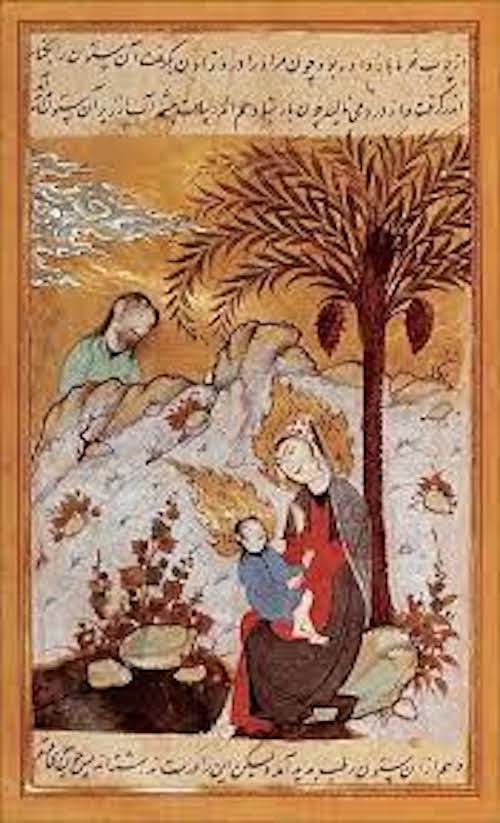Ann Arbor (Informed Comment) – Christians are often surprised to discover how important Jesus is to the Muslim spiritual tradition. The Muslim scripture, the Qur’an, praises him as a Word from God and affirms the Virgin Birth. In Muslim civilizations with painting traditions, such as the Mughals in India, Jesus, Mary and the nativity became an important artistic and spiritual theme. Muslim mystics like Jalalu’d-Din Rumi interpreted the birth pangs of the Mother Mary as an allegory for the pain each soul suffers in trying to give birth to its own Jesus, its higher self. The Persian poet Hafez of Shiraz wrote about the symbolism of Jesus’ ascension into heaven.
This year I want to point to some verses of Farid al-Din Attar of Nishapur (1145-1221). Attar was what we would now call a pharmacist, but also a perfume maker. So he was the one you would go to for the equivalent of Pepto Bismol to settle your tummy, but also for this season’s Chanel N°5. He was a highly successful pharmacist, said to have been besieged by customers. In his spare time he wrote spiritual poetry. He does not appear to have traveled much, but the city of Nishapur in eastern Iran under the Saljuq Empire saw a lot of dramatic events, including nomadic conquests– as Richard Bulliet explains. In 1221 when Attar Was 76, the Mongols invaded Nishapur from Central Asia, and he was killed.
In the collection of Attar’s work, “50 Poems” can be found a depiction of the infant Jesus as a symbol of innocence, the sort of innocence that is the secret infancy of which adults have lost sight. In the Qur’an it is alleged, as in the pseudepigraphic infancy gospels of late antiquity, that Jesus spoke from the cradle. Attar uses this image to make Jesus the essence of innocent infancy:
- The secret infancy has all the traits of Jesus;
like Jesus it speaks with sweetness from the cradle.
As the rose sweated from my Beloved’s face
a pure moistener like rosewater entered my mouth.
In the same volume, we find:
- Firstly they became dust beneath the feet of dogs,
lastly like the wind they bowed their head to their Lord.
Attar whose words gave life to the soul,
found that Jesus became their companion.
Here Jesus is a symbol of humility and the putting aside of ego so as to become as dust before God. When they reach that estate of self-effacement, they discover that Jesus has become their companion.

Attar’s great classic was The Conference of the Birds, of which the best translation is that of Dick Davis and Afkham Darbandi. He also wrote the “Divine Book,” translated by J. A. Boyle, and lyric poetry as well.
In the Ilahi-Nama (Boyle translation), Attar says:
- “Like the Prophet David play this melody; like Jesus breathe the love of thy friend.”
“And had not Jesus been the Word of God, how should he in his glory have been the Pure Spirit?”
David was famed for his melodic Psalms, and Jesus for exemplifying God’s love (God is called “the Friend” or the “Beloved” by Sufis).
Jesus is also a symbol of self-denial. Attar depicts him in “The Conference of the Birds” as riding on a donkey and deploys this image as a symbol of the higher self mastering the carnal self, and purifying the soul with love:
- The Self, that whirlpool where our lives are wrecked;
As Jesus rode his donkey, ride on it;
Your stubborn Self must bear you and submit –
Then burn this Self and purify your soul;
Let Jesus’ spotless spirit be your goal.
Destroy this burden, and before your eyes
The Holy Ghost in glory will arise.
Welcome, dear nightingale – from your sweet throat
Pour out the pain of lovers note by note.
An anecdote about Jesus is also attributed to Attar, saying that once Jesus was passing through a small town and some of his coreligionists taunted and reviled him. He replied by praying for them. An observer was astonished and asked him why he had not lashed out against them. Jesus replied, “I can only spend what I have in my purse.”
That is, he had no rancor in him, only love and forgiveness.


 © 2026 All Rights Reserved
© 2026 All Rights Reserved